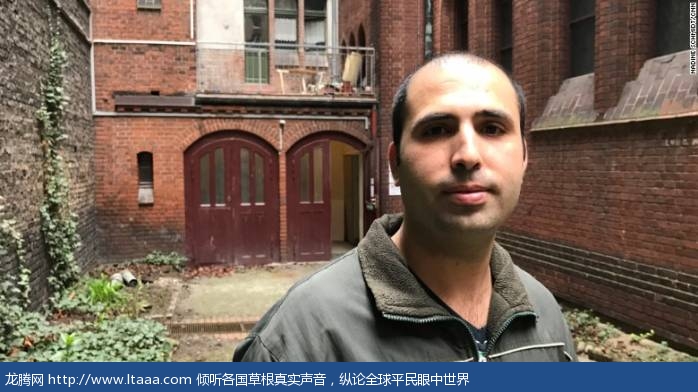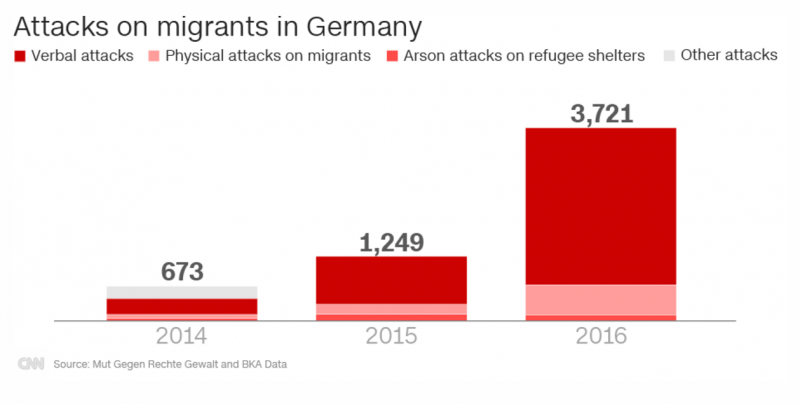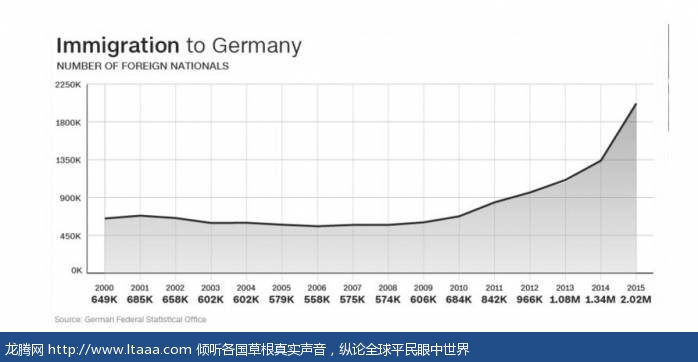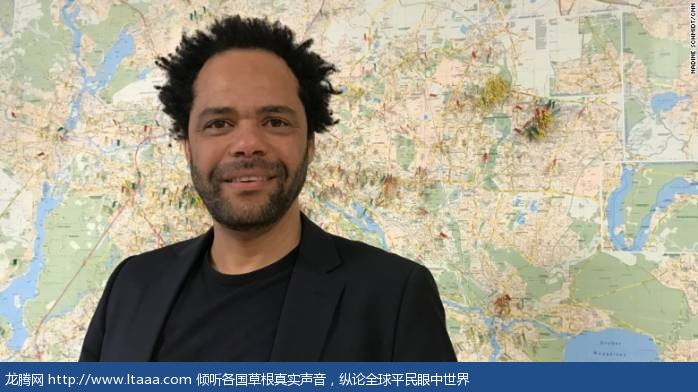【CNN】叙利亚难民:“德国不再让我感到安全” [美国媒体]
柏林(美国有线电视新闻网络)—— 回想其那晚的惊魂遭遇,Fares Naem双手颤抖、面露恐慌——那晚他试图阻止极右翼的袭击,结果他也成了攻击目标。这个叙利亚难民当时在柏林米特区的一列电车上,目击了两个白人痛骂一名黑人乘客。
‘I no longer feel secure’ in Germany, Syrian refugee says
叙利亚难民:“德国不再让我感到安全”
Berlin (CNN)Handstrembling, face panic-stricken, Fares Naem recalls the night hetried to stop a far-right attack -- only to become its target. The Syrianrefugee was on a tram in central Berlin when he spotted two white men hurlingabuse at a black passenger.
柏林(美国有线电视新闻网络)—— 回想其那晚的惊魂遭遇,Fares Naem双手颤抖、面露恐慌——那晚他试图阻止极右翼的袭击,结果他也成了攻击目标。这个叙利亚难民当时在柏林米特区的一列电车上,目击了两个白人痛骂一名黑人乘客。
"I could notkeep silent," he says. "What really shocked me was that no one didanything. I simply felt I had to say something."
“我不能坐视不管,”他说,“最令我震惊的是所有人都视若无睹,我觉得我必须要有所表示。”
Naem began filmingthe confrontation on his mobile phone -- drawing the attention, and the anger,of the man's attackers. In retaliation, they turned on him.
Naem 开始用手机录制冲突场面——这吸引了攻击者的注意以及愤怒,作为报复,他们将目标转向了他。
When he tried toflee at the next stop, the men dragged him behind a shop and assaulted him.Bloodied and beaten, he went into the store to ask for help, but says he wasignored.
当他试图在下一站逃跑时,那两个男人把他拖到了一家商店后面殴打了他。他被打得鲜血淋淋,跑进一家商店寻求帮助,但没有人理他。
Another man cameto his aid. Naem says the man apologized, insisting, "Not allGermans are like that." But the attack left him scared.
最后另外一个男人伸出了援手。Naem称这个男人向他道歉,坚称“不是所有德国人都像那样。”但是这场袭击还是让他吓坏了。
"I lost mymobile phone. I was beaten. Especially psychologically, I was hurt," hesays. "And that was difficult. It was not the physical assault thatbothered me most, it was more that there are people out there who have racistideas in their minds and that people did not help me."
“我手机丢了,人也被打了,更重要的是心理受到了伤害,”他说,“那是很困难的,最令我生气的不是殴打本身,而是那些内心持种族主义观点的人,还有漠视我援助请求的人。”
Right-wingviolence is on the rise in Germany. The country's Federal Bureau ofInvestigation (BKA) received more than 3,700 reports of attacks on asylumseekers and refugees in 2016, a dramatic increase of 200% from the year before.
在德国,右翼的暴力活动逐渐上升。2016年,德国联邦调查局收到了3700起针对寻求庇护者和难民的袭击报告,相比前一年急剧上升200%。
Fares Naem wasattacked in Berlin. "It was not the assault that bothered me [but] thatthere are people out there who have racist ideas in their minds and people whodid not help."
(Fares Naem 在柏林受到袭击:“最令我生气的不是袭击本身,而是那些有种族主义思想的人,还有漠视我援助请求的人。”)
Physical andverbal attacks like the one Fares experienced are the mostcommon, and they happen frequently on public transport, as his did.
Fares说,像他经历的这种身体和言语攻击是非常普遍的,经常在公共交通上发生。
This is, in part,a backlash to German Chancellor Angela Merkel's brief open door policy thatallowed almost a million refugees into the country in 2015. In 2016, 280,000migrants applied for asylum. Most came from Syria, Afghanistan, Iraq, Iran,Eritrea and Pakistan.
导致这种情况的部分原因是德国总理默克尔遭到强烈反对的门户开放政策,2015年将近一百万难民获准进入这个国家,2016年,28万名移民申请庇护,他们中大部分来自叙利亚、阿富汗、伊拉克、伊朗、厄尔特利亚和巴基斯坦。
德国攻击移民案件量
Merkel's policyproved polarizing -- large parts of the community initially embraced refugees,greeting them at railway stations, and offering them food and places to stay.
默克尔的政策引发了极端变化。绝大部分社区一开始是乐于接受难民的,他们在火车站迎接难民,为他们提供食物和住处。
But the welcomecooled after the sexual assaults in Cologne on New Year's Eve 2015, wherepolice say scores of migrant men assaulted women during firework displays inthe city's main square.
然而这种热情欢迎在2016年除夕发生科隆性侵案后冷了下来,警方称大量男性移民在城市主广场举办的烟火表演上侵犯女性。
Germany keeps tabson known neo-Nazi groups -- and police keep an especially watchful eye on thenorth-eastern state of Saxony. Compared to other German states, Saxony hastaken in fewer refugees, but has one of the highest rates of attacks onrefugees in the country.
德国正在密切关注号称“新纳粹”的众多组织——警方尤其警惕东北部的萨克森州。萨克森州相比其他州接纳的难民更少,却有着全国最高的袭击难民案发案率。
It was here thatthe right-wing Pegida group was founded in 2013 to promote the so-called"Peaceful Europeans against the Islamization of the West" movement.
2013年,右翼反伊斯兰化组织正是成立在这个州,该组织旨在推动所谓的“欧洲和平爱好者反对西方泛伊斯兰化”运动。
Incidents like theCologne attacks have provided fertile ground for neo-Nazi groups such as the"Freital Group" of violent extremists based in the small town ofFreital in Saxony.
科隆性侵案此类事件为新纳粹组织提供了沃土,例如由暴力极端分子创建的,驻扎在萨克森州Freital小镇的“Freital集团”。
德国移民数量
But Germanauthorities are fighting back -- the group of eight neo Nazi activists is ontrial; federal prosecutors argue that the group's attacks on refugee sheltersand left-wing politicians in 2015 and 2016 are tantamount to that of aterrorist cell.
但德国当局也在反击——一个有8名新纳粹主义活动分子的组织正在接受审判。联邦检察官指控该组织于2015、16两年对难民庇护所和左翼政治家发动了袭击,其相当于一个恐怖组织。
And some formerfar-right extremists are turning their backs on violence. Enrico (nothis real name) has been undergoing counselling through the "SteigAus" (Get out) program in Saxony, which supports those who want to breakfree from the right-wing scene and start a new life.
与此同时,部分前极右翼极端分子也在抛弃暴力思想。Enrico(化名)一直萨克森州在接受心理辅导项目,该项目旨在帮助那些希望脱离右翼思想、开始新生活的人。
The 40-year-oldformer neo-Nazi recalls a time when hatred and violence were his everydaycompanions: "I wanted to provoke and then I was provoked myself by thesepeople. We attacked asylum shelters, threw explosives at their homes. I onlythought about the consequences in hindsight," he says in a newly-releasedvideo aimed at combating right-wing extremism.
在最新公布的反对右翼极端主义的视频中,这个40岁的前新纳粹主义分子回想起充斥着仇恨和暴力的日子时说:“我想要激怒(难民),结果自己反倒先被激怒了。我们袭击庇护所,朝他们房子扔爆炸物,事后我才考虑清楚了这样做的后果。”
Germany's FederalOffice for the Protection of the Constitution estimates that 22,600 people inthe country hold far-right views. At least 40% of those are thought to bewilling to resort to violence in pursuit of their ideologies.
德国联邦宪法保护办公室估计德国有22600人持极右观点,并认为其中至少40%愿意为其意识形态付诸暴力。
Eben Louw, apsychologist at an anti-violence aid group in Berlin. The map behind him showsall the attacks on refugees and migrants recorded in the city. "What isnew is the level of brazenness."
(Eben Louw 是柏林一个反暴力援助组织的心理学家。他身后的地图上标明了所有针对难民和移民的攻击记录:“无耻程度达到了新境界”)
Eben Louw is apsychologist at Opra Gewalt -- an anti-violence aid group -- who counselsrefugee victims like Fares Naem. He says threats cancome from anywhere.
Eben Louw 是反暴力援助组织OpraGewalt 中的一名心理学家,为Fares Naem这样的难民受害者提供建议,他说威胁无处不在。
"One's nextdoor neighbour can become a violent attacker within minutes because they don'twant to see refugees in their country -- and not only refugees ... [but] anyperson who is perceived as a migrant."
“你的邻居可能眨眼间变成一名暴力袭击者,就因为他们不想在这个国家看到难民——不仅仅是难民,还包括所有被当成移民的人。”
Naemdoes not know who his attackers were --and may never get an answer to that question; the police have yet to make anyarrests in the case.
Naem 不认识袭击他的人——很可能永远也无法知道;警方至今没有逮捕任何人。
All that remainsis a mental scar: "I only want to stay in my room, I no longer feel secureto leave the house and sometimes I no longer trust Germans," he says.
整个事件残留下来的只有精神创痕,他说:“我只想待在我的房间,我再也不能在户外感受到安全感,有时我甚至不再相信德国人。”
All he does knowis that, having escaped the war in his own country only to be attacked in hisadopted home, Germany has become less of a safe haven.
他所知道的只是,才脱虎口,又入狼穴——德国不再是安全的避风港。
版权声明
我们致力于传递世界各地老百姓最真实、最直接、最详尽的对中国的看法
【版权与免责声明】如发现内容存在版权问题,烦请提供相关信息发邮件,
我们将及时沟通与处理。本站内容除非来源注明五毛网,否则均为网友转载,涉及言论、版权与本站无关。
本文仅代表作者观点,不代表本站立场。
本文来自网络,如有侵权及时联系本网站。
图文文章RECOMMEND
热门文章HOT NEWS
-
1
Why do most people who have a positive view of China have been to ...
- 2
- 3
- 4
- 5
- 6
- 7
- 8
- 9
- 10
推荐文章HOT NEWS
-
1
Why do most people who have a positive view of China have been to ...
- 2
- 3
- 4
- 5
- 6
- 7
- 8
- 9
- 10














